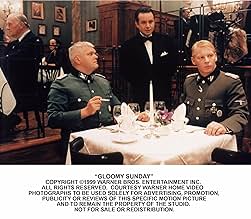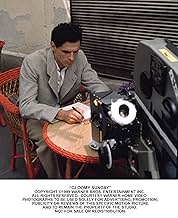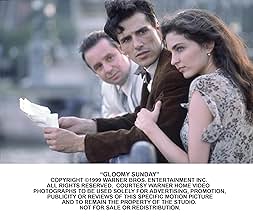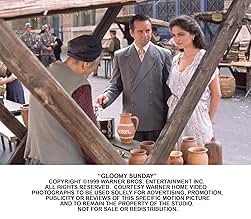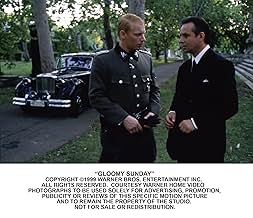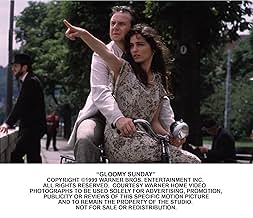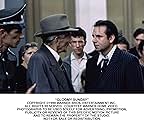PUNTUACIÓN EN IMDb
7,8/10
8,7 mil
TU PUNTUACIÓN
Añade un argumento en tu idiomaFollows three men who are in love with a beautiful waitress during World War II: an intellectual restaurant owner, a mysterious musician, and an erratic businessman.Follows three men who are in love with a beautiful waitress during World War II: an intellectual restaurant owner, a mysterious musician, and an erratic businessman.Follows three men who are in love with a beautiful waitress during World War II: an intellectual restaurant owner, a mysterious musician, and an erratic businessman.
- Dirección
- Guión
- Reparto principal
- Premios
- 7 premios y 5 nominaciones en total
Reseñas destacadas
...on why this film is doing well in communities unafraid to see subtitled films. For one thing, the beginning and ending create and resolve a compelling mystery (most of the film is a flashback). For another, you may or may not believe that a song could drive people to suicide, but you must admit it is a beautiful, sad and haunting melody. The story held my interest, as did the characters. The other obvious appeal was the opportunity to gaze endlessly at the incredibly lovely and angelic Erika Marozsán. I am female and straight and I could not get enough of looking at her; I could easily believe that she might inspire a piece of music that conveyed its composer's hopeless longing for her. (And he wasn't so hard to look at himself!) The only thing I couldn't figure out about Mr. Simpson's comments was what the film had to do with New Zealand. Now I know: nothing! :-)
According to the Los Angeles Times review of this film, "The song was actually composed in 1935 by Rezsö Seress, with lyrics by László Jávor, and did in fact accompany a number of suicides as Europe grew darker; Billie Holliday recorded a popular American version." So I guess it's not so far-fetched after all! Who knew?
According to the Los Angeles Times review of this film, "The song was actually composed in 1935 by Rezsö Seress, with lyrics by László Jávor, and did in fact accompany a number of suicides as Europe grew darker; Billie Holliday recorded a popular American version." So I guess it's not so far-fetched after all! Who knew?
10crisbob
Beautiful Budapest, end of the thirties. Lazlo Szabo a middle-aged jew Hungarian runs a chic restaurant with a beautiful waitress,Ilona who is also his mistress. One day they decide to hire a pianist, and it's Ilona who choose. And it's a good choice because the handsome young man, Andras, creates a wonderful mood on the premises. Little by little he falls desperately in love with Ilona and composes specially for her a song, very melancholic, and a bit misterious. He calls it " Gloomy sunday ". This song brings surprisingly a lot of suicides. The love-triangle functions pretty well until the time a german customer, Hans, who comes regularly in the restaurant falls in love with Ilona, without success.A few years later the german army invades Hungary, Hans is back as a highly placed officer and the jewish condition of Lazlo is going to complicate the lives of the four protagonists. This movie is a master- piece and I'd bet if the film had been produced in Hollywood with Stone, Douglas and Harrison Ford, directed by Cassavetes it would have gained several Oscars. It has all a movie fan can expect from a good film -and more. Beautiful scenery, very good story, marvelous music, talent of the actors, and even a bit of sex. I rarely see a picture twice on the same day. This time I did.
I wrote this review in December of 2012 when the movie was titled "Gloomy Sunday." A great movie experience. I'm 82 (then) and had been watching movies since I was 18 months old, held in my mother's arms. This is an unforgettable film. Every facet is superb. The acting is flawless, the cinematography is breathtaking, and the gripping story has every human emotion imaginable. It's hypnotic from start to finish, but keep in mind, you have to be attentive. There are some subtle touches that can go unnoticed if you're not carefully observing and listening, and missing them can possibly deprive you of fully understanding and enjoying the fantastic ending. The skilled director doesn't use a heavy hand, and that's admirable. Every single actor gives a perfect performance. Having studied acting for five years, I must mention that they don't act, they behave. Erika Marozsán's portrayal is colossal!. I've fallen in love with her. Even if I were 18 months old now, there's a scene with Joachim Król I'd remember the rest of my life. I've viewed that particular scene about eight times. Gut-wrenching, yet inspirational. Never in my life have a watched any movie four times, and I just saw this one again for the fourth time... in one week! If not for IMDb and Netflix, I would never have heard of it. And it received no nominations for the Academy Awards. Ridiculous! This is truly a masterpiece! I'd never written a review for IMDb before this, but for this film I had to do it. I cannot praise this movie enough!
This film is about the life of a woman, who got caught between 2 lovers against a backdrop of the turbulent times of the Holocaust.
Words cannot describe how beautiful and powerful this film is. Everything is excellent. The sets are beautiful, and the scenes are beautifully composed. Ilona is great as the lady which every men would fall in love with. She has this graceful elegance which is very magnetic. Laszlo's work as the restaurant owner is convincing, he has every detail of the restaurant under control. The music is great. When I listened to the song "Gloomy Sunday', I felt this chill spreading through my body, as if I was going to be the next victim. Another highlight for me is the uptight secretary who lives by the book, which is clearly a satire about the German culture. The plot is highly touching and powerful, and I do urge everyone to see this beautiful film.
Words cannot describe how beautiful and powerful this film is. Everything is excellent. The sets are beautiful, and the scenes are beautifully composed. Ilona is great as the lady which every men would fall in love with. She has this graceful elegance which is very magnetic. Laszlo's work as the restaurant owner is convincing, he has every detail of the restaurant under control. The music is great. When I listened to the song "Gloomy Sunday', I felt this chill spreading through my body, as if I was going to be the next victim. Another highlight for me is the uptight secretary who lives by the book, which is clearly a satire about the German culture. The plot is highly touching and powerful, and I do urge everyone to see this beautiful film.
"Gloomy Sunday (Ein Lied von Liebe und Tod)" is a very mittel-European take on "Jules et Jim."
It has resonance with "The Pianist," but was produced in 1999 and is only being released in the U.S. now. Based on an urban legend grounded in fact it demonstrates how a piece of music can perfectly capture the zeitgeist of its times, so much so that it influences people's lives to end them. The original facts, with a list of recordings, are documented at www.phespirit.info/gloomysunday/ which is how I knew to find Marianne Faithfull's recording in my collection to play as I write this.
A love quadrangle starts off as an open, free-spirited affair between a jovial restaurant owner and his high-spirited, sensual hostess, becomes a complex three-some with a sultry composer, then an uptight tourist gets tangled in their lives. But this is Budapest 1933 - 1945, and the personal becomes the political, as the restauranteur is Jewish, the tourist transforms into an S.S. officer, and the composer's signature melody haunts them and the airwaves throughout a Europe falling like dominoes.
While there are lovely shots of the bridges and narrow streets of Budapest in a warm, lush cinematography, especially as seen on desperate bicycle rides (in dress and high heels no less), much of the movie takes place in the restaurant, so that the passage of time and the resulting changing stresses are marvelously shown by the actors' body language. Some of the coincidences are a bit thick, but the political commentary up to the present is effectively pointed.
The melody only gains in power throughout the film and is much more timeless in capturing the feelings of the time -- and any parallel experiences--than the pop or patriotic music Americans associate with the period. From the untranslated credits, it seemed that the closing version in English is Artie Shaw's, though the lead singer wasn't identified there. In the film, the lyrics are an after-thought to try and capture the music's meaning.
It has resonance with "The Pianist," but was produced in 1999 and is only being released in the U.S. now. Based on an urban legend grounded in fact it demonstrates how a piece of music can perfectly capture the zeitgeist of its times, so much so that it influences people's lives to end them. The original facts, with a list of recordings, are documented at www.phespirit.info/gloomysunday/ which is how I knew to find Marianne Faithfull's recording in my collection to play as I write this.
A love quadrangle starts off as an open, free-spirited affair between a jovial restaurant owner and his high-spirited, sensual hostess, becomes a complex three-some with a sultry composer, then an uptight tourist gets tangled in their lives. But this is Budapest 1933 - 1945, and the personal becomes the political, as the restauranteur is Jewish, the tourist transforms into an S.S. officer, and the composer's signature melody haunts them and the airwaves throughout a Europe falling like dominoes.
While there are lovely shots of the bridges and narrow streets of Budapest in a warm, lush cinematography, especially as seen on desperate bicycle rides (in dress and high heels no less), much of the movie takes place in the restaurant, so that the passage of time and the resulting changing stresses are marvelously shown by the actors' body language. Some of the coincidences are a bit thick, but the political commentary up to the present is effectively pointed.
The melody only gains in power throughout the film and is much more timeless in capturing the feelings of the time -- and any parallel experiences--than the pop or patriotic music Americans associate with the period. From the untranslated credits, it seemed that the closing version in English is Artie Shaw's, though the lead singer wasn't identified there. In the film, the lyrics are an after-thought to try and capture the music's meaning.
¿Sabías que...?
- CuriosidadesWieck, the Nazi played by Ben Becker, is a fictionalized SS Col. Kurt Becher, who was acquitted in Nuremberg of war crimes and who ended up the richest man in Germany.
- PifiasAt a movie theater, the trio watches a newsreel that declares that the song "Gloomy Sunday" "drove 157 people in Hungary to suicide in the past eight weeks." It's unknown whether that statement ever actually appeared in a German newsreel during the war. There is no evidence that the song ever actually drove more than a handful of people--if any--to suicide.
- ConexionesFeatured in Die Männer vom K3: Jugendliebe (1999)
- Banda sonoraSzomorú Vasárnap/Gloomy Sunday
Music by Rezsö Seress
Lyrics by László Jávor
English lyrics by Sam Lewis (as Sam M. Lewis)
Akla Musikverlag Berlin
Selecciones populares
Inicia sesión para calificar y añadir a tu lista para recibir recomendaciones personalizadas
- How long is Gloomy Sunday?Con tecnología de Alexa
Detalles
- Fecha de lanzamiento
- Países de origen
- Idiomas
- Títulos en diferentes países
- The Piano Player
- Localizaciones del rodaje
- Empresas productoras
- Ver más compañías en los créditos en IMDbPro
Taquilla
- Recaudación en Estados Unidos y Canadá
- 585.604 US$
- Fin de semana de estreno en EE. UU. y Canadá
- 7102 US$
- 22 jun 2003
- Recaudación en todo el mundo
- 646.532 US$
- Duración1 hora 52 minutos
- Color
- Mezcla de sonido
- Relación de aspecto
- 1.85 : 1
Contribuir a esta página
Sugerir un cambio o añadir el contenido que falta

Principal laguna de datos
What is the Spanish language plot outline for Gloomy Sunday (1999)?
Responde

